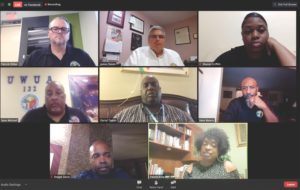When I watched the funeral services of George Floyd, a gentleman, a Black man who lost his life under the knee of a police officer, and listened to the speakers’ words of comfort and remorse to the family, I could not help but reflect on my own life’s experiences as a child growing up in the Black community and witnessing the impact of police brutality. At the end of the service, I stood for eight minutes and 46 seconds. It seemed like a lifetime. As I stood, I thought about George Floyd’s murder, how he pleaded for his life and called out to his mother. Then I reflected on other murders and brutality imposed upon Black men and women, throughout our nation’s history.
As I walked down memory lane with tears streaming down my face, I remembered the civil rights struggle, I remembered the protest, the looting, the rioting. I remembered the police brutality, racist comments from some white people, and my treatment as an African-American. I was taken on an emotional roller coaster ride. I was filled with anger, hurt, frustration, bewilderment, confusion, disgust, guilt and hopelessness.

Then, in the very midst of all those emotions I began to reflect on where we are now. Thanks to social media and what the world witnessed across the globe, we have a level of awareness unlike any before. We have an overwhelming following in support of men and women of all colors, races, creeds, religions, ethnic backgrounds, and sexual orientation who are taking a stand against racism, against oppression, against brutality, and against outright murder! It’s no longer acceptable to just be non-racist, now it’s important to be anti-racist — to speak out against those things that have been barriers in the past, to look at the systematic and systemic problems that have created the things that we are experiencing now. It’s time to have real and uncomfortable conversations, build strategies and design methods and practices for sustainability once they are put into place.
It is my personal belief that as a union, this is one of our most important roles. For I am reminded that the Rev. Dr. Martin Luther King, Jr. dedicated his life to the civil rights movement and sacrificed his life in support of sanitation (union) workers April 4, 1968 in Memphis, Tennessee.
I know we have UWUA leaders who stand against racism, who stand for that which is right. However, I also know we have racism that has infiltrated our union family. And that goes against everything unions stand for. We have to call out racism where we see it and come together to eradicate it. That’s what union solidarity is based upon — looking out for and protecting each other. It’s the very foundation of unions.
I have hope today. I’m confident we’ll overcome this as a country and as a union. It’s not going to be easy. It’s going to take some difficult conversations and people getting comfortable with being uncomfortable. But together we can, and will, do it together!

